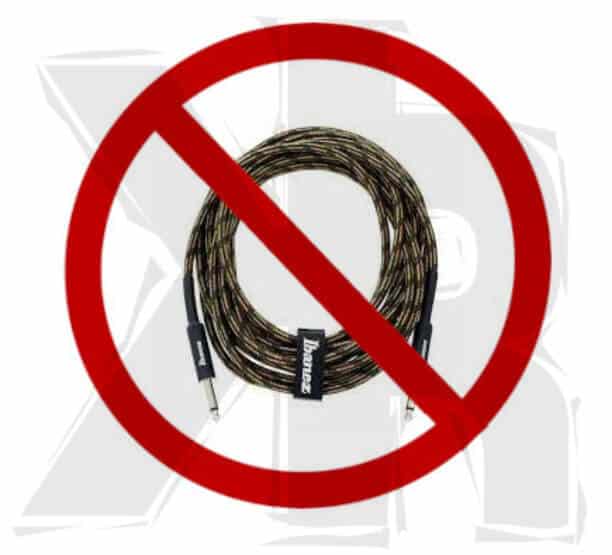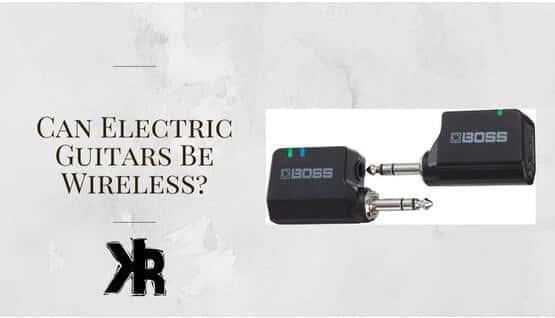Table of Contents
Can electric guitars be wireless? This is a question that has been asked by many guitar players over the years when cables become a burden. Looking for a solution then becomes a priority to help make their setup easy to manage.
Yes, electric guitars can be used with a wireless transmitter system. This will then eliminate cables and replace them with a transmitter and receiver. This will your signal wirelessly. They are easy to set up and simple to use!
In this Killer Rig article, we will look at some of the benefits of using a wireless system for your electric guitar.
Can Electric Guitars Be Wireless?
With the technology we have in the guitar world, making our rigs easier to use is a top priority. Many companies have developed products to help us get rid of those pesky guitar cables.
Yes, you can go wireless and ditch your cables! You can now get your electric guitar signal to your amplifier without any cables at all. This is as simple as purchasing a wireless system that consists of two modules.
One is a transmitter that connects to your guitar’s output jack. The other module is a receiver that connects to the input of your amplifier. These devices then communicate with each other and send your guitar signal wirelessly.
Reasons To Go Wireless
There are several advantages to using a wireless setup for your electric guitar.
First and foremost, it rids you of pesky cords. No more stumbling over tangled cables or worrying about tripping mid-performance. And who wouldn’t love the increased mobility on stage, without a cord acting as an anchor?
A wireless system also has potential to diminish unwanted feedback. Cables can sometimes act like noise magnets, picking up excess sounds, especially in loud venues or when your amp loves to chirp. Going wireless means less chance of these noise disturbances.
Your guitar’s tone might also get a boost. A wireless system can help cut down the capacitance in your signal path. What’s that, you ask?
It’s essentially an unwanted buildup of electric charge that can dampen your tone. Lowering the capacitance means enhancing the quality of your sound.
Choosing The Right Wireless System
There are many great systems available, and the first decision you need to make is whether to choose an analog or digital system. Both have their own advantages.
Another important factor to consider is the battery life and range of the system. Think about whether you need a system that lasts longer on a single charge or one that offers higher performance. The choice is yours and it can significantly affect your experience.
While navigating the world of wireless systems can seem tricky, it’s also very exciting.
The wireless industry offers a wide variety of options to explore. Rest assured, we’ll provide guidance and support throughout your decision-making process. Let’s begin by exploring the two most common options.
Learn how to play guitar without an amp here!
Analog
Analog wireless guitar systems are not as popular as they used to be. This is because digital systems have come a long way in recent years and offer much better sound quality.
Analog systems are still used by some guitar players. This is because they have less latency and better bandwidth. But they also color your tone to a certain degree, so there is a trade-off with some systems.
Digital
Digital wireless guitar systems convert the signal from analog to digital. It starts in the transmitter and then is sent to the receiver.
The signal is sent wirelessly similar to Wi-Fi at a frequency of 2.4GHz. This can create latency issues in certain systems. But with the great technology we have today, that is becoming a thing of the past.
More guitarists use digital wireless systems because they are becoming very fast. They also don’t add any coloring to the tone.
You also don’t need to use any license as you do with an analog system for roaming. This makes a digital wireless system the best way to go.

Range
Think of a wireless system like a radio wave, invisible but powerful, transmitting across a distance. A common question is, “How far can the signal travel before it weakens or becomes unreliable?”
Typically, wireless systems have a range of about 50 feet. However, this can vary. Some systems are capable of transmitting over longer distances, even up to 100 feet or more.
But it’s important to remember that obstacles can affect the range of a wireless signal. Walls and other barriers can reduce the signal strength.
So, when using a wireless system in a large room or outdoors, consider these potential obstructions and how they might impact the system’s effectiveness.
Battery Life
The battery life of a wireless system is one of the most important considerations. Most systems will last for about 8 hours on a single charge. But there are some that will only last for 4 to 5.
If you’re planning on using your system for long gigs, you’ll need to make sure that it has adequate battery life.
Number of Channels
The number of channels is the different frequencies that a system can transmit. Most systems have at least 2 channels. But some of the newer ones have up to 6.
Is using a wireless system in a crowded area the plan? Then you’ll need to make sure that it has just enough channels to avoid interference.
Price
The quality and functionality of a wireless system might affect the pricing. However, in general, you should budget between $200 and $500 for a high-quality system.

Are There Disadvantages to Going Wireless?
There are a few disadvantages to using a wireless system for your electric guitar. The first is that they can be more expensive than simply using instrument cables. An extra expense comes with using a device like this.
They also rely on and require batteries. Most wireless guitar systems will use AA batteries. They will need to be replaced periodically. It’s also possible that they die while in the middle of a performance, which could be catastrophic!
Another disadvantage is that they can be more susceptible to interference. This is because they are using radio frequencies to send the signal.
First, from the transmitter, then to the wireless receiver. There are ways to reduce or eliminate this interference, but it is something that you need to be aware of.
Latency is also an issue with some digital systems. This causes a lagging delay. Normally, between when you strum your strings and the amplifier receiving the signal. This can be bad when you’re in a band setting, trying to keep time with the other instruments.
These are all things to consider when going wireless and selecting the right system to use.
Conclusion
Going wireless with your electric guitar can be a freeing experience. Especially if cables have been very inconvenient with your rig.
The sound and range can be just as good or better! So choose a system that you feel is a good fit and enjoy the benefits that come along with it!
FAQs
Do Wireless Systems Work With Active Pickups?
Yes, wireless systems will work with active pickups. In fact, most systems are designed to work with a variety of different types of guitars and pickups. They are made to sound and respond the same as using a guitar cable.
Will Guitar Wireless Systems Work With Any Amplifier?
Guitar wireless systems work with all amplifiers from tube to solid state. The transmitter will send the signal from the guitar to the receiver. Which is then normally connected to an amplifier or modeler.
What is the Difference Between 2.4 and 5.8 GHz for Wireless Guitars?
5.8 GHz has a shorter range, but is less susceptible to interference than 2.4 GHz. This is because there are fewer systems and devices using 5.8 GHz.

